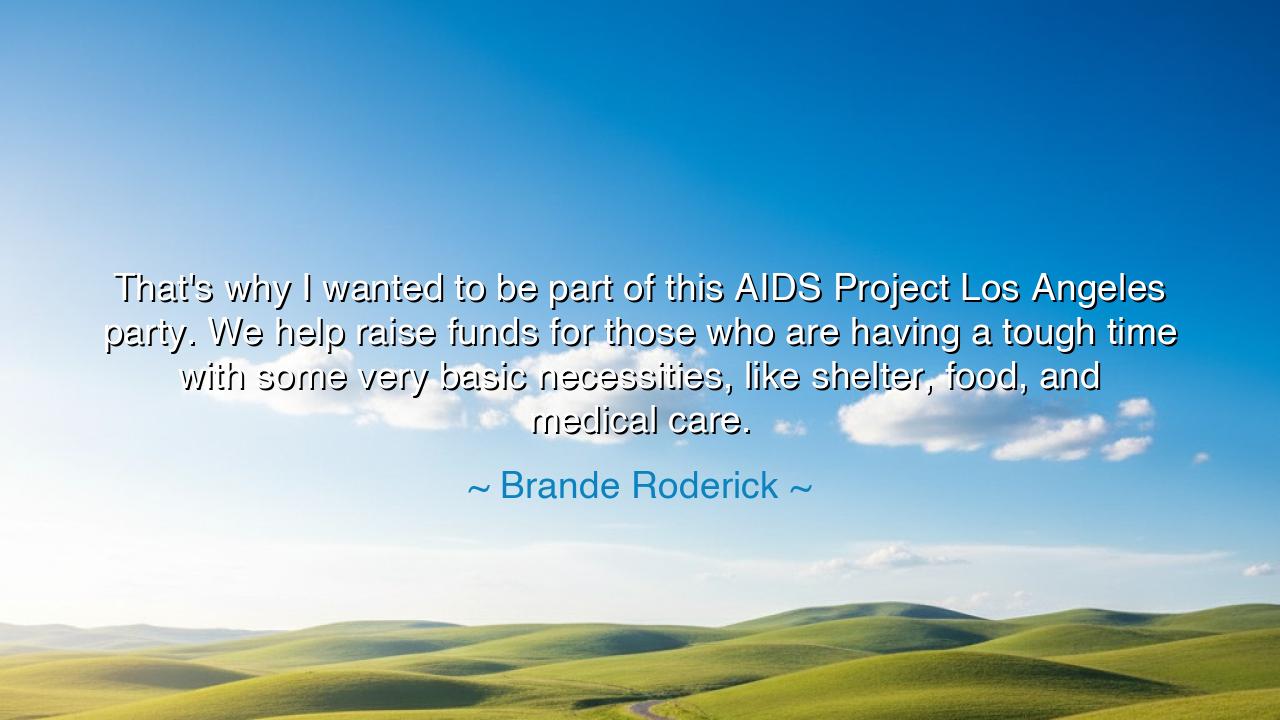
That's why I wanted to be part of this AIDS Project Los Angeles
That's why I wanted to be part of this AIDS Project Los Angeles party. We help raise funds for those who are having a tough time with some very basic necessities, like shelter, food, and medical care.






Hear the words of Brande Roderick, who declared with compassion and clarity: “That’s why I wanted to be part of this AIDS Project Los Angeles party. We help raise funds for those who are having a tough time with some very basic necessities, like shelter, food, and medical care.” In this humble utterance lies a timeless truth—that the measure of a society is not in its wealth, nor in its power, but in its care for those who struggle to meet the most basic necessities of life. To provide shelter, food, and medical care is to affirm the dignity of every human being, and to abandon this duty is to turn away from the very heart of humanity.
The meaning of these words shines in their simplicity. Roderick does not speak of grand monuments or lofty ambitions, but of what is essential: a roof overhead, bread for the body, and healing for the sick. She reminds us that when disease strikes, when poverty takes root, when misfortune darkens a person’s days, it is not luxury they cry for but survival itself. Her words are a call to compassion, urging us to stand with those who suffer, for in their pain lies the test of our collective soul.
The origin of this truth flows from the scourge of AIDS, which for decades tore through communities, leaving devastation in its wake. In its early years, victims were not only afflicted by sickness, but also by stigma, isolation, and neglect. Many were cast out by families, abandoned by institutions, and left to face suffering alone. Out of this darkness arose organizations like AIDS Project Los Angeles, born not of profit but of mercy, offering care where society had failed. Roderick’s words honor this legacy, affirming that compassion must not be idle but active, raising resources to meet the needs of the most vulnerable.
History, too, reveals this principle. Consider the story of Mother Teresa, who in the streets of Calcutta did not build palaces, but lifted the dying from gutters, gave them shelter, food, and dignity in their final hours. Her greatness lay not in conquest but in compassion, not in wealth but in her refusal to ignore suffering. In her life, as in Roderick’s words, we see the eternal lesson: when we give to those in need, we touch the very essence of what it means to be human.
The emotional power of Roderick’s statement lies in its focus on the basic and the essential. In an age where many chase luxury and abundance, she calls attention to those who lack the minimum needed to survive. To speak of shelter, food, and medical care is to strip life to its foundations, to remind us that no person can flourish until these needs are met. Her words strike not only the mind but the heart, challenging us to see beyond our own abundance and recognize the struggles of those who walk beside us unseen.
The lesson is clear: each of us has a role to play in easing the burdens of others. You may not cure disease, you may not rebuild nations, but you can give, you can support, you can extend compassion. Just as small drops of rain fill mighty rivers, so too do small acts of kindness sustain great works of mercy. To turn away from those in need is to weaken the bonds of society, but to stand with them is to strengthen the foundation of humanity itself.
Therefore, let your actions be guided by this wisdom. If you have wealth, share it. If you have time, give it. If you have influence, use it for the good of others. Support organizations that labor for the sick and the poor. Open your eyes to the suffering in your own community, and do not delay in acting. For to provide basic necessities is not charity alone—it is justice, it is mercy, it is the duty of every soul who walks this earth.
And so, remember the words of Brande Roderick: to give food, shelter, and medical care is to lift the broken and restore their dignity. Such acts are not small, but heroic, for they preserve life itself. Let this truth be passed down: that the measure of your life is not how high you rise, but how many you lift up as you climb.






AAdministratorAdministrator
Welcome, honored guests. Please leave a comment, we will respond soon